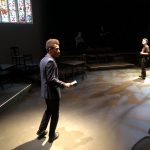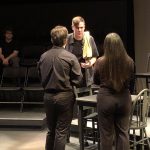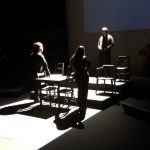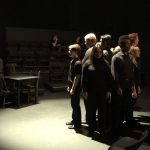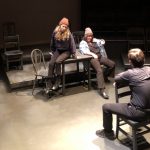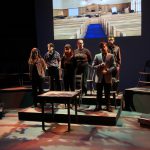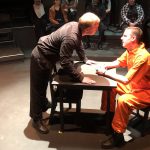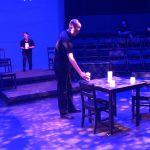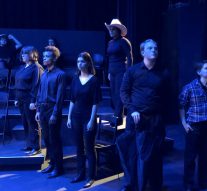
SPC Theater Presents The Laramie Project
SPC Programs & Events October 31, 2019By Erika Salemme
On October 13th, the St. Petersburg College Theater Department presented The Laramie Project in the Arts Auditorium on the Clearwater campus. Many audience members arrived early to the 2:00 pm performance and were ushered onstage.
Seating was limited for this play as the audience had to sit in chairs on the stage instead of using the traditional auditorium seats. While there were fewer seats, most of them were filled by SPC students, faculty, and family members. The seating arrangements were unique but added a level of intimacy and realism to the audience’s experience. The close proximity of the audience allowed them to be easily drawn into the story and though the stage was set up very simply, this allowed the audience to focus more on the acting skills of the students.
Head of the theater department and director of The Laramie Project, Scott Cooper, opened the play and welcomed the audience. After a few words from Cooper, the stage went dark and a single spotlight appeared, marking the beginning of the story. The actors stepped forward into the light as they shared their fond recollections of living in the town of Laramie, Wyoming. That was before the incident occurred.
The Laramie Project tells the true story of a brutal murder that greatly affected the town of Laramie and the way the government dealt with hate crimes at that time. On October 6, 1998, a 21-year-old man, Matthew Shepard, was beaten and left to die tied to a fence (Blair). Why? Some people believed it was the result of a drug deal gone bad while others thought it was a robbery that went too far. Most people saw it for what it truly was, a crime of hate against a man for being gay.
The play was created by Moises Kaufman, who gathered his group, the Tectonic Theater Project to find the truth behind the attack. The group traveled from New York City six times and conducted over 200 interviews in Laramie. The conversations that took place between the Tectonic Theater group and the townspeople were edited but used faithfully in the play. Hearing the actual words of the townspeople brought out the horror of the story even more than if the lines had been created from Kaufman’s own mind.
Each of the actors from the SPC Theater Department portrayed the different reactions of the townspeople of Laramie after the crime. They captured the emotions and the viewpoints of the diverse individuals living in Laramie. From the Unitarian and Mormon pastors to a Muslim student and a lesbian teacher, the actors communicated how each person was affected by the attack or how they had even felt discrimination themselves. This hate crime ultimately led to a powerful movement that no one could have predicted to occur in this small Wyoming town.
Instead of a lot of dialogue between characters, actors stood alone and thought out loud. This added to the drama of the play as the audience was allowed to experience what was going on inside the minds of the townspeople. When the actors quoted their lines, the audience could feel the anger, sadness, and fight in the actors’ voices. Friends, teachers, and townsfolk recalled receiving the news of Matthew’s beating and the pain, anger, confusion, and sadness that arose. The townspeople spoke of how the media descended on their secluded town and how, with their influence, the story travelled around the world.
After being asked if they thought plays that dealt with social issues were important, one SPC student replied, “I feel that plays dealing with social issues are inevitable because everyone has something to say about something, and I feel that as long as the play covers all different sides and isn’t too biased, that they can be informative and entertaining.”
The Laramie Project certainly showed different perspectives of the event. By displaying the conflicting feelings of the townspeople, the actors allowed the audience to connect with those characters that shared their same viewpoint. The actors also forced the audience to realize that a crime had been committed and how actions taken now could stop these hate crimes from happening. The talented actors were passionate about their performance. There were times when they seemed so open and real, it was as if they were actually reliving their experiences.
Once it was over, the audience clapped enthusiastically while a few even stood in appreciation for the actors. The message that the SPC theater department wanted to send was clear. They were standing for something they believed in and were spreading the message that no one should live in fear because they are different.
